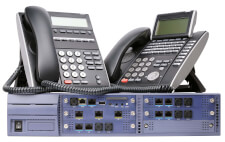PBX
Stands for "Private Branch Exchange." A PBX is a local telephone system designed for a business or organization. It allows a large number of users to share only a few external phone numbers.
A private branch exchange is an internal telephony solution that also enables users to communicate externally through outside "POTS" phone lines. Instead of requiring each person to have a phone number, users are assigned extensions that serve as unique identifiers within the PBX. External callers can dial a single phone number and reach different people by entering their extension.
Traditional PBX
A traditional PBX phone system is comprised of a local control unit and individual telephones. The control unit (or "base server") handles internal calls between users as well as external communications. It includes a storage device that logs voicemails and call histories.
Early PBX systems were completely analog, meaning all communications took place through analog phone lines. More recent "traditional" PBX systems have digital lines and may use Ethernet cables rather than telephone cables for internal communication lines. A process called SIP trunking converts digital signals to analog if necessary when calling outside lines.
Hosted PBX
A hosted PBX is a cloud-based solution that does not require a local control unit. Instead, each user has a VoIP phone that connects directly to a router or switch. The PBX administrator can add, remove, and manage users with a software interface, typically via a web browser.
Since a hosted PBX is cloud-based, users do not need to reside in the same physical location. Therefore, a hosted PBX is ideal for businesses with remote workers.
 Test Your Knowledge
Test Your Knowledge